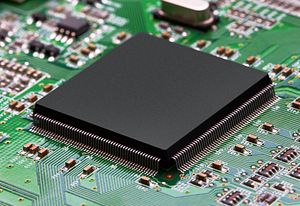A Chinese technology group is set to make a $23 billion bid to take over U.S. memory and semiconductor firm Micron, The Wall Street Journal reported on Tuesday. If successful, Tsinghua Unigroup Ltd’s bid be the largest-ever takeover of a U.S. firm by a Chinese company.
The bid, which would represent a 19.3 percent premium over Micron’s stock price on Monday, hasn’t been made official yet. A Tsinghua Unigroup source told Reuters the offer could be made “as early as Wednesday.” A Micron spokesperson denied having received a buyout offer.
As its name suggests, Tsinghua Unigroup is controlled by Tsinghua University, China’s most prestigious science and engineering university (and Xi Jinping’s alma mater). That makes Tsinghua Unigroup a state-owned firm, although Intel Corp. bought a 20 percent stake in the conglomerate last year. This bid for Micron, coming after Unigroup purchased two Chinese chip-making companies (RDA Microelectronics and Spreadtrum) in 2014, positions the conglomerate as China’s unquestioned leader in semicondcutor technology.
The move comes against a larger backdrop of China’s government encouraging moves that boost China’s domestic capabilities when it comes to producing high-tech product. China’s reliance on foreign technology has long been a sore spot for leaders, for both financial and security reasons. In 2014, Xinhua reported that China spent more importing chips than importing oil, spending over $231 billion on imported chips in 2013. “[P]rolonged underdevelopment of China’s chip sector could derail the country’s economic upgrade and blunt its competitiveness,” Xinhua warned.
Around the same time, after the leaks from former U.S. National Security Agency contractor Edward Snowden, Beijing grew even more convinced that reliance on foreign technology left it vulnerable to hacks and cyber espionage by foreign governments. Those concerns–plus an overarching goal to make China a globally acknowledged leader in high-tech–led to the ambitious goal of ridding China of foreign technology in key sectors from government agencies to banks by 2020.
To achieve that goal, domestic innovation (for example, China’s efforts at developing a home-grown operating system) is one part of the puzzle. But it’s unlikely China can wean itself off foreign technologies quickly enough to suit Beijing by innovating alone. Thus the other side of the coin: simply buying up foreign tech companies. The semiconductor industry has become a major target for such initiatives. As Bloomberg noted last December, Chinese firms spent close to $5 billion taking over five separate chip-related firms from 2012 to 2014–and many of those deals involved state funding.
Crucially, these takeovers give Chinese semiconductor firms access to precious intellectual property, helping them break out of what Xinhua described a “a vicious circle: companies cannot gain a competitive edge and increase profits without owning key technologies, while meager profits limit their ability to invest in research and development.”
However, a Chinese bid to take over Micron would face scrutiny from the U.S. government – namely, CFIUS (the Committee on Foreign Investment in the United States), which reviews foreign investments in U.S. companies for potentially national security issues. Washington has already raised concerns about Chinese state-backed technology firms being beholden to Beijing, possibly to the extent of inserting backdoors into their products. In 2012, a congressional investigation concluded that Chinese firms Huawei and ZTE should not be allowed to set up telecommunications networks in the United States due to security concerns stemming from the opaque nature of the relationship between China’s government and Chinese firms.
Any bid to take over Micron would likely face similar hurdles, as concerns over Chinese cyber espionage and hacking have only grown over the past three years. One analyst based in Shanghai told Reuters the chances of CFIUS approving the deal would be “next to zero.”

































